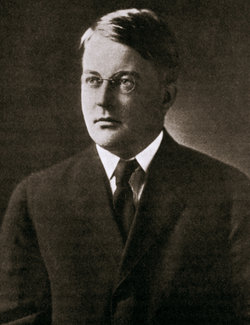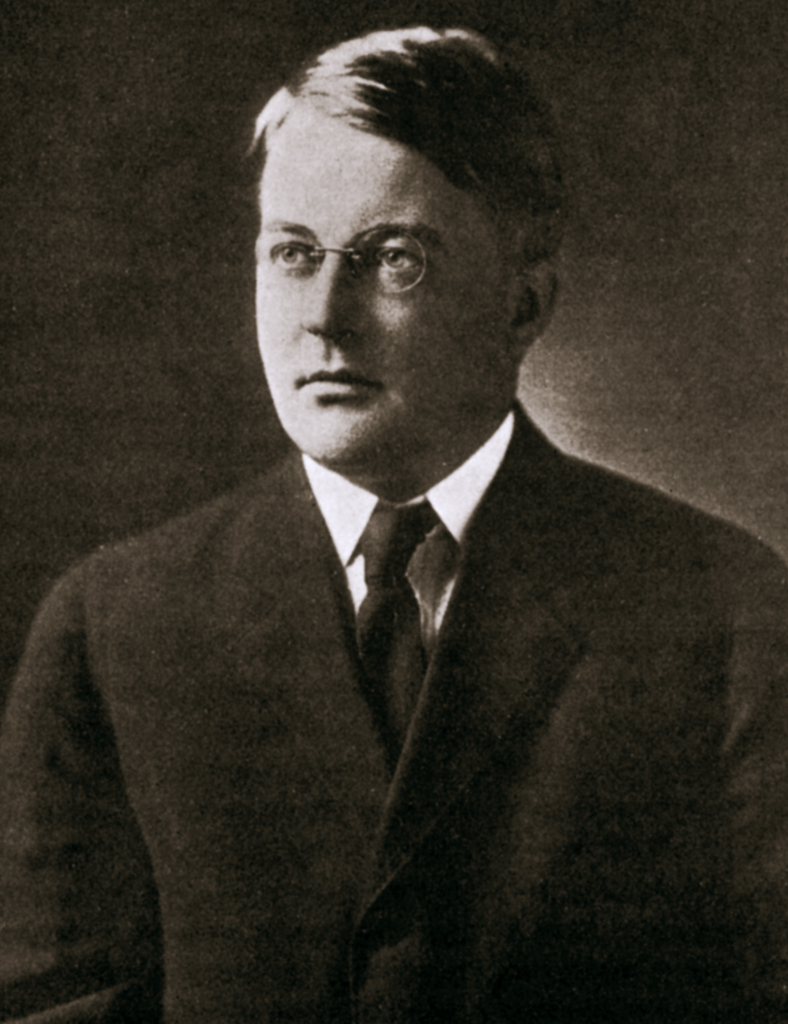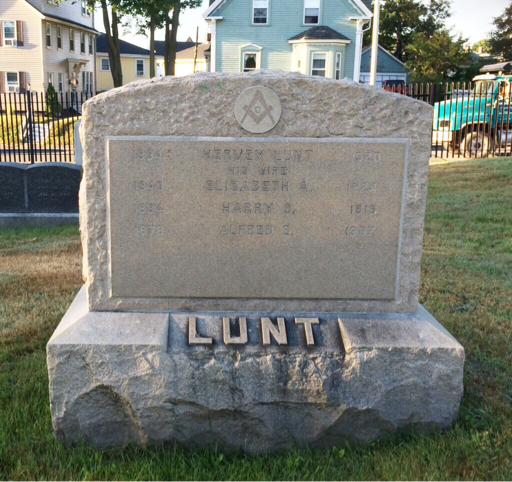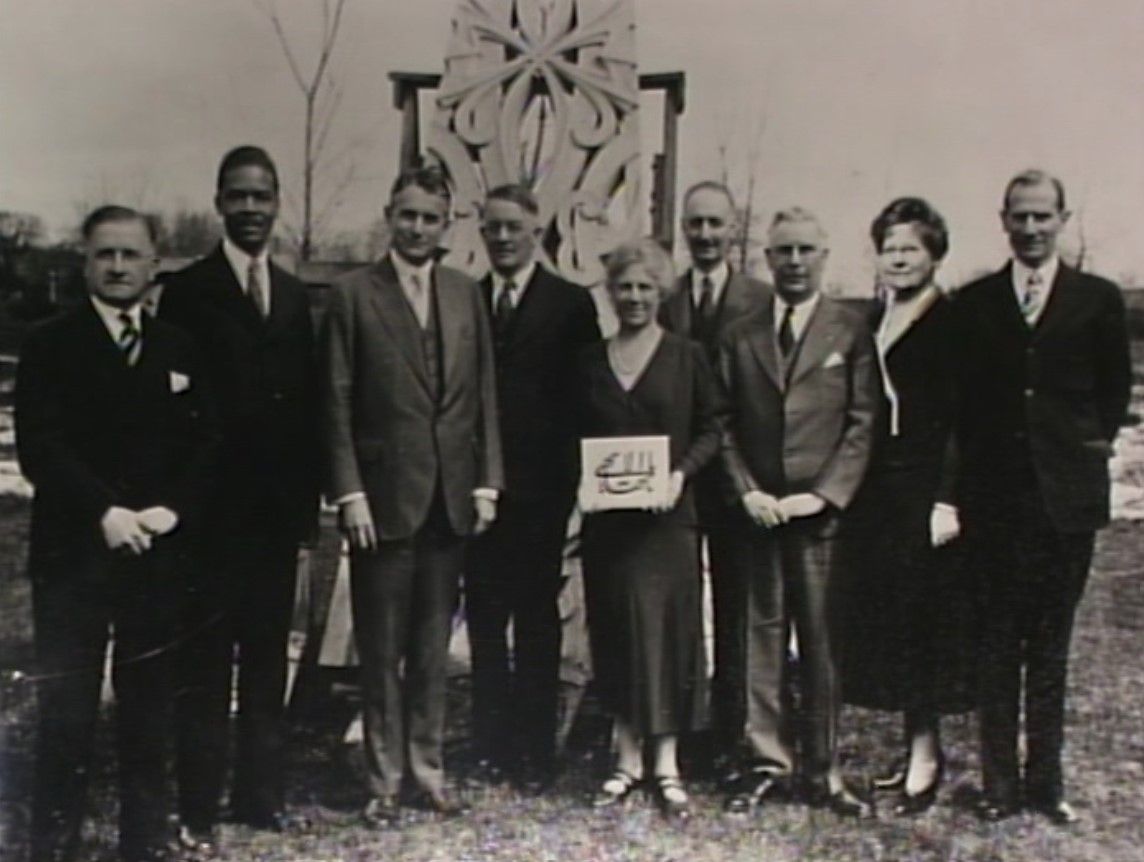OCCUPATION: Attorney
Alfred Eastman Lunt – “esteemed beloved Lunt”; “a precious, ardent and capable champion of our beloved Faith”; “the living embodiment of such a rare combination of qualities as few can display and none can surpass”
Alfred departed this life on August 12, 1937, at his home in Beverly, Massachusetts. His immediate family-a widow and five children, and a host of friends mourn his loss. His funeral was attended by his relatives, neighbors and visiting Baha'is from Green Acre and neighboring centers.
He was for more than a generation one of the most distinguished and useful servants of Baha’u’llah. He was well prepared by college and legal education at Harvard University. As a student he heard the Great Message from Dr. 'Ali-Kuli Khan, lecturing in the University. He obtained from it a life and inspiration toward achievement. He had very unusual abilities which shone in the field of writing and in his chosen profession, the law.
As a youth he edited and published a newspaper. As a Harvard student, he managed its Illustrated Magazine, making it successful as a business enterprise. While in college he was chosen President of its Republican Club, and then President of the National Republican College League, which included clubs organized in most of the colleges of the United States. He served actively in this capacity in several Presidential campaigns, and those acquainted with his achievements, and the respect with which he was held, are confident that had he not chosen to turn his energies with concentrated attention toward the Bahi'i Faith, realizing that all other means were ineffective, he would have risen to positions of great importance in the government.
As a lawyer, he became Solicitor of his native city, and an associate in a well established and popular law firm in Boston. Called by Miss Sarah J. Farmer to act as her legal counsel, he took the leadership in evolving those plans that protected her spiritual program and the Green Acre properties.
His services to the Green Acre Fellowship, at a very critical period in its existence, as well as over a number of years, were perhaps among the most valuable of his career, a career noteworthy for the variety and number of its accomplishments. Although the opposition retained very able counsel and aroused adverse public sentiment and widespread newspaper criticism, carrying the matter to the Supreme Court of the State of Maine, the final decision was a complete victory for the Baha'is and the friends of Miss Farmer. A few years later, this victory having established a new trend, Green Acre came under the jurisdiction of the National Spiritual Assembly, as the first Baha'i Summer School in America.
In his work he was ever guided by the Baha'i ideal of service, and his clientele was a very broad one. His wise and sympathetic understanding brought many clients of foreign birth, and though often poor and unable to pay adequately for his services, he never failed them, but with wise guidance, increased their understanding, and acquainted them with the spirit and point of view which was the inspiration of his own life.
The trials and vicissitudes of fortune appeared only to confirm his faith, for in all situations he showed those characteristics, which 'Abdu'l-Baha, in referring to the Green Acre controversy, described as "lion hearted."
He was from the beginning of the Cause in Boston, a member of its governing body. During many years he was elected by the Boston friends as one of the delegates to the Annual Convention. Of this body, he was many times chosen Chairman, the duties of which office he discharged with extraordinary ability. He conceived it to be his duty, not only to be acquainted with all the important matters under consideration, and to act with justice, but to stimulate all the delegates, in the assumption and exercise of their privileges and responsibilities.
He was a member of the Baha'i Temple Unity, the first corporation organized to build the Mashriqu’l Addkar. With the exception of two short intervals he had membership in the National Spiritual Assembly during the entire period of its existence. In these two national bodies, serving sometimes as chairman, sometimes as secretary, and as a member of its various committees, he showed signal devotion and ability.
He was affectionate and kind, reflecting the Divine love in his readiness to serve the neglected, poor and weak, a mark of true nobility. He made himself one with people of various races, classes and nationalities in the line of service. He had his place also among the strong, who drew upon his fine endowment of power, and from whom, his capacities and virtues won admiration.
Faithful unto death was he, traveling long distances over the country for administration and teaching when his body was weakened with a malady which finally proved fatal. Meanwhile he showed no lessening of spiritual attraction, devotion and power. Just two days before his passing, he wrote a most cheerful and hopeful letter to one of his friends, telling of his plans for future activities.
Those who mourned his passing were consoled by the spiritual fragrance that attended it, and by the eloquent tributes paid him by the Guardian's cables, as well as by the testimony of many friends. An extraordinary honor was shown him by the members of the National Spiritual Assembly, which body at the Guardian's request, and in his behalf, journeyed to his grave, to offer prayers. Truly his was the victorious life. (By Louis G. Gregory and Harlan Ober; The Baha’i World 1936-1938)
OCCUPATION: Attorney
Alfred Eastman Lunt – “esteemed beloved Lunt”; “a precious, ardent and capable champion of our beloved Faith”; “the living embodiment of such a rare combination of qualities as few can display and none can surpass”
Alfred departed this life on August 12, 1937, at his home in Beverly, Massachusetts. His immediate family-a widow and five children, and a host of friends mourn his loss. His funeral was attended by his relatives, neighbors and visiting Baha'is from Green Acre and neighboring centers.
He was for more than a generation one of the most distinguished and useful servants of Baha’u’llah. He was well prepared by college and legal education at Harvard University. As a student he heard the Great Message from Dr. 'Ali-Kuli Khan, lecturing in the University. He obtained from it a life and inspiration toward achievement. He had very unusual abilities which shone in the field of writing and in his chosen profession, the law.
As a youth he edited and published a newspaper. As a Harvard student, he managed its Illustrated Magazine, making it successful as a business enterprise. While in college he was chosen President of its Republican Club, and then President of the National Republican College League, which included clubs organized in most of the colleges of the United States. He served actively in this capacity in several Presidential campaigns, and those acquainted with his achievements, and the respect with which he was held, are confident that had he not chosen to turn his energies with concentrated attention toward the Bahi'i Faith, realizing that all other means were ineffective, he would have risen to positions of great importance in the government.
As a lawyer, he became Solicitor of his native city, and an associate in a well established and popular law firm in Boston. Called by Miss Sarah J. Farmer to act as her legal counsel, he took the leadership in evolving those plans that protected her spiritual program and the Green Acre properties.
His services to the Green Acre Fellowship, at a very critical period in its existence, as well as over a number of years, were perhaps among the most valuable of his career, a career noteworthy for the variety and number of its accomplishments. Although the opposition retained very able counsel and aroused adverse public sentiment and widespread newspaper criticism, carrying the matter to the Supreme Court of the State of Maine, the final decision was a complete victory for the Baha'is and the friends of Miss Farmer. A few years later, this victory having established a new trend, Green Acre came under the jurisdiction of the National Spiritual Assembly, as the first Baha'i Summer School in America.
In his work he was ever guided by the Baha'i ideal of service, and his clientele was a very broad one. His wise and sympathetic understanding brought many clients of foreign birth, and though often poor and unable to pay adequately for his services, he never failed them, but with wise guidance, increased their understanding, and acquainted them with the spirit and point of view which was the inspiration of his own life.
The trials and vicissitudes of fortune appeared only to confirm his faith, for in all situations he showed those characteristics, which 'Abdu'l-Baha, in referring to the Green Acre controversy, described as "lion hearted."
He was from the beginning of the Cause in Boston, a member of its governing body. During many years he was elected by the Boston friends as one of the delegates to the Annual Convention. Of this body, he was many times chosen Chairman, the duties of which office he discharged with extraordinary ability. He conceived it to be his duty, not only to be acquainted with all the important matters under consideration, and to act with justice, but to stimulate all the delegates, in the assumption and exercise of their privileges and responsibilities.
He was a member of the Baha'i Temple Unity, the first corporation organized to build the Mashriqu’l Addkar. With the exception of two short intervals he had membership in the National Spiritual Assembly during the entire period of its existence. In these two national bodies, serving sometimes as chairman, sometimes as secretary, and as a member of its various committees, he showed signal devotion and ability.
He was affectionate and kind, reflecting the Divine love in his readiness to serve the neglected, poor and weak, a mark of true nobility. He made himself one with people of various races, classes and nationalities in the line of service. He had his place also among the strong, who drew upon his fine endowment of power, and from whom, his capacities and virtues won admiration.
Faithful unto death was he, traveling long distances over the country for administration and teaching when his body was weakened with a malady which finally proved fatal. Meanwhile he showed no lessening of spiritual attraction, devotion and power. Just two days before his passing, he wrote a most cheerful and hopeful letter to one of his friends, telling of his plans for future activities.
Those who mourned his passing were consoled by the spiritual fragrance that attended it, and by the eloquent tributes paid him by the Guardian's cables, as well as by the testimony of many friends. An extraordinary honor was shown him by the members of the National Spiritual Assembly, which body at the Guardian's request, and in his behalf, journeyed to his grave, to offer prayers. Truly his was the victorious life. (By Louis G. Gregory and Harlan Ober; The Baha’i World 1936-1938)
Family Members
Sponsored by Ancestry
Advertisement
Advertisement















